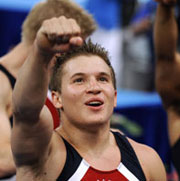
A coalition of disability group has called for a boycott of the R-rated satire “Tropic Thunder“. They are asking people not to see the movie because they say it
Special Olympics Chair Timothy Shriver said:
Some may think we ought to lighten up and not get so worked up because this is, after all, just a film. But films become part of pop culture and character lines are repeated in other settings time and time again. It’s clear to me that lines from this particular film will provide hurtful ammunition outside the movie theatre. While I realize that the film’s creators call this a parody and they never intended to hurt anyone, it doesn’t mean those words won’t.
I respect their concerns for the dignity of the disabled, but they are simply wrong and their comments reflect such a fundamental misunderstanding of the film that it is impossible to believe that anyone connected with these statements actually saw it. I side with the other movie critics who have said that this film is not disrespectful or inappropriate in the treatment of disabled people.
The movie in no way makes fun of developmentally disabled people. On the contrary. It makes fun of pretentious actors who think they can win awards by portraying developmentally disabled people.
The satire is unequivocally directed at those who are so pretentious and condescending that they try to gain credibility as actors and win awards by portraying disabled people. In a very real sense, it is one of the most bracingly direct statements in support of the dignity and value of the disabled I have ever seen. The idiocy of the actor characters is in part demonstrated by their use of the offensive terms and the audacious and shrewd discussion of shameless award-mongering brilliantly skewers not only the actors who feel good about themselves because they play disabled characters but those who feel good about themselves for rewarding them.
It is often demeaning when a “magical” minority or disabled character is used to as a narrative mechanism to give the “normal” characters a lesson or inspire them. And it is infuriating when the disability is the only characteristic; it is very rare in movies for disabled characters to have any personalities or plot not directly connected to the disability. The lack of authenticity in these portrayals is more of a threat to understanding and respect for the disabled than “Tropic Thunder.”
This is not like the “Mongo” character in “Blazing Saddles,” who understandably inspired complaints from the disability community. It is also not like the movie “The Ringer“, about a man who pretended to be developmentally disabled so he could compete in the Special Olympics–which was made with the cooperation and support of Shriver’s organization. Shriver and the coalition now say that the term “retard” is offensive in and of itself, no matter what the purpose. Yet the movie they participated in and endorsed repeatedly used the terms “‘tard” and “feeb.” This is a movie that insists on more respect for people with disabilities than either of those films.
The objections made by the coalition are out of context not just with regard to the interests they represent but in the larger context of the film as a whole. Another controversial element of the movie is actor Robert Downey Jr.’s appearance in blackface. He plays a white Australian actor known for getting so deeply into the roles he plays that he stays in character until he’s taped the DVD commentary. When Downey’s character is cast as a black American, he undergoes a surgical procedure to darken his skin. Again, the movie’s point of view was sharply critical of Downey’s character for thinking that he knew anything whatsoever about being black. The rapper character (a black character played by a black actor) stands in for the audience when he shows his contempt for the whole situation. He says there is one good part for a black man in the movie and they give it to “Crocodile Dundee,” underscoring the movie’s point. The scene where Downey’s character ends up quoting the theme song for “The Jeffersons” to express his feelings says it all–and is topped off by his un-phased response when called on it–“just because it’s a theme song doesn’t mean it’s not true.” And then the film brilliantly adds even another layer when the rapper is struggling with his own issues of stereotyping.
The points being made here, in addition to the satiric jabs at some of Hollywood’s most-lauded performers, are important ones about the limits of any commercial product to fairly and authentically convey the story of minority and disabled characters and the pressure this puts on minority writers, producers, and performers. These themes are also explored in “Bamboozled,” a flawed but stunningly provocative and important movie. Another movie that is even better on a similar theme is the neglected “Dancing in September” with Isaiah Washington and Nicole Ari Parker.
I care very deeply about the portrayal of disabled characters in the media. I have disabled family members and my first job was at a school for what were then still called “the retarded.” I try to make it a point to discuss the portrayal of disabled characters in the movies and DVDs I review. Two very good examples were “Finding Nemo” and (I am not kidding) “Bratz.” In my opinion, anyone who is offended by a condescending portrayal of disabled and minority characters should see that this movie is, too.


